Sigma Xi Distinguished Lecturers, 2010-2011
Abstracts
Each lecturer has designated his or her topic(s) for three different types of audiences. Where more than one level is shown, the lecture can be adjusted to the needs of the audience:
- P (Public)
Aimed at presenting scientific issues of general concern to a public audience.
- G (General)
Intended for a normal Sigma Xi audience of both scientists and other scholars representing a broad range of disciplines.
- S (Specialized)
Aimed at scientists and students in fields that are closely related to that of the lecturer.
Gary D. Christian
Professor of Chemistry Emeritus
University of Washington
Box 351700
Seattle, WA 98195-1700 United States
Phone: 425-454-9361
E-mail: christian@chem.washington.edu
Web:http://depts.washington.edu/chem/people/
faculty/christian.html
Gary D. Christian received his B.S. degree in 1959 from the University of Oregon and Ph.D. degree from the University of Maryland in 1964. He was a research analytical chemist at the Walter Reed Army Institute of Research, 1961 to 1967. He joined the University of Kentucky in 1967, and in 1972 moved to the University of Washington as Professor of Chemistry. He was Divisional Dean of Sciences in the College of Arts and Sciences, 1993-2001. Christian's research interests include electroanalytical chemistry, atomic spectroscopy, and flow methods of analysis. He is the author of over 300 papers and has authored books on: Atomic Absorption Spectroscopy; Trace Analysis; Analytical Chemistry (6 editions); Instrumental Analysis (2 editions); Problem Solving in Analytical Chemistry; and Quantitative Calculations in Pharmaceutical Practice and Research.
He was a Fulbright Scholar at the Université Libre de Bruxelles in 1978-79. His honors include the American Chemical Society (ACS) Division of Analytical Chemistry Award for Excellence in Teaching , the ACS Fisher Award in Analytical Chemistry, and the Université Libre de Bruxelles Medal of Honor, Talanta Gold Medal, Charles University Commemorative Medal, Deakin University Geoff Wilson Medal, Japanese Association for Flow Injection Analysis Scientific Honor Award Medal, Senior Scholar Award of the Thailand Research Fund, and the University of Ghent Honorary Certificate of Research. A special issue of the journal, Electroanalysis, was dedicated in his honor on his 65th birthday. He received an Honorary Doctorate Degree from Chiang Mai University and was made an honorary member of the Japanese Society for Analytical Chemistry. He is listed in over four dozen professional directories, including Who's Who in America, American Men and Women in Science, and Who's Who in American Education. Dr. Christian serves or has served on the editorial boards of eighteen journals. He has been Editor-in-Chief of Talanta since 1989.
David W. Frayer
Professor
University of Kansas
Department of Anthropology, KU
Fraser Hall, Room 622
1415 Jayhawk Blvd
Lawrence, KS United States
Phone: 785-841-716
E-mail: frayer@ku.edu
Web: http://www2.ku.edu/~kuanth/people/
faculty_frayer.shtml
David Frayer is a Professor in the Department of Anthropology, University of Kansas, Lawrence. With degrees from Miami University (BA, 1969), Case Western Reserve University (MA, 1971) and the University of Michigan (PhD, 1976) he has focused in European paleoanthropology and dental anthropology. His early research involved the internal dynamics and long-term evolutionary trends in European Upper Paleolithic and Mesolithic populations. For the past two decades he has extensively published (independently and with a variety of American and European scholars) on the relationship between Neandertal and subsequent European populations. Ongoing research concerns various projects about the Croatian Neandertal site of Krapina, the dental anthropology of an early, preceramic Neolithic site of Merhgarh in Pakistan, early Homo from Eritrea and the so-called 'hobbit" from Flores, Indonesia. He has published widely in national and international books and journals on topics ranging from Neandertal toothpick use to evidence for human massacres in the German Mesolithic to evidence for language origins.
S. Douglass Gilman
Associate Professor of Chemistry, Louisiana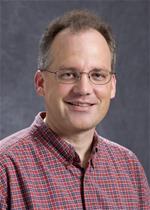 State University
State University
232 Choppin Hall
Department of Chemisry
Louisiana State University
Baton Rouge LA 70810
Phone: 225-578-3010
Email: sdgilman@lsu.edu
Website:http://chemistry.lsu.edu/site/People/Faculty/
Doug%20Gilman/item1091.html
- Studying Enzyme Inhibition with Electrophoresis - Migrating Through the Chemist's Bucket (G,S)
Doug Gilman is an Associate Professor of Chemistry at Louisiana State University in Baton Rouge. He earned a B.S. in Chemistry at Harvey Mudd College in 1989 where he carried out undergraduate research in synthetic chemistry under the direction of Bill Daub. Doug attended graduate school at Penn State University, working in the areas of bioanalytical chemistry and neuroscience in the laboratory of Andy Ewing. After completing his Ph.D. in 1994, Doug accepted a postdoctoral position with Bruce Hammock, in the Departments of Entomology and Environmental Toxicology at UC Davis. In 1997 Doug started as an Assistant Professor at the University of Tennessee in Knoxville. In 2004 he moved to LSU where his research program focuses on the development of new bioanalytical techniques to study enzyme inhibition and protein aggregation. He also studies electroosmotic flow dynamics and the immobilization of magnetic particles in capillaries and microfluidic devices.
Michael F. Goodchild
Professor of Geography
University of California, Santa Barbara
909 West Campus Lane
Goleta, CA 93117 United States
Phone: 805-455-6529
E-mail: good@geog.ucsb.edu
Web: www.geog.ucsb.edu/~good
Michael F. Goodchild is Professor of Geography at the University of California, Santa Barbara, and Director of spatial@ucsb. He received his BA degree from Cambridge University in Physics in 1965 and his PhD in Geography from McMaster University in 1969. After 19 years at the University of Western Ontario, he moved to Santa Barbara in 1988. He was elected member of the National Academy of Sciences and Foreign Fellow of the Royal Society of Canada in 2002, and member of the American Academy of Arts and Sciences in 2006. He was Editor of Geographical Analysis between 1987 and 1990 and Editor of the Methods, Models, and Geographic Information Sciences section of the Annals of the Association of Americal Geographers from 2000 to 2006. He serves on the editorial boards of ten other journals and book series. His published books include Accuracy of Spatial Databases; Geographical Information Systems: Principles and Applications; Environmental Modeling with GIS; Scale in Remote Sensing and GIS; Interoperating Geographic Information Systems; Geographic Information Systems and Science; Uncertainty in Geographical Information; Foundations of Geographic Information Science; Spatially Integrated Social Science; GIS, Spatial Analysis, and Modeling; and Geospatial Analysis: A Comprehensive Guide to Principles, Techniques and Software Tools. In addition he is author of some 400 scientific papers. He was Chair of the National Research Council's Mapping Science Committee from 1997 to 1999, and currently chairs the Advisory Committee on Social, Behavioral, and Economic Sciences of the National Science Foundation. His current research interests center on geographic information science, spatial analysis, and uncertainty in geographic data.
Paula Hammond
Bayer Professor of Chemical Engineering,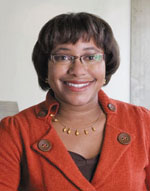 Massachusetts Institute of Technology
Massachusetts Institute of Technology
Department of Chemical Engineering
Massachusetts Institute of Technology
Room 66-352
77 Massachusetts Ave
Cambridge MA 02139
Phone: 617.258.7577
Email: hammond@mit.edu
Website: http://web.mit.edu/hammond/lab/
- Self Assembly of Responsive Thin Films (G,S)
- Nanoscale Assembly for Targeted Drug and Gene Delivery (G,S)
Paula Hammond currently serves as the Bayer Professor of Chemical Engineering, Massachusetts Institute of Technology. She received her Ph.D. from the Massachusetts Institute of Technology in 1993. Her current research interests include macromolecular design and synthesis, directed assembly using surface templates, nanoscale design of biomaterials, block copolymers, asymmetric morphologies and liquid crystalline polymeric materials.
In 1994 Dr. Hammond was awarded the NSF Postdoctoral Fellowship in Chemistry while performing postdoctoral research in the Harvard University Chemistry Dept as a member of the Whitesides research group. In 2000, Professor Hammond was awarded the Junior Bose Faculty Award, and the GenCorp Signature University Award. She has also received the NSF Career Award, the EPA Early Career Award, the DuPont Young Faculty Award, and the 3M Innovation Fund Award. Dr. Hammond was one of a group of key faculty members involved in the planning and writing of the proposal for the Institute for Soldier Nanotechnologies (ISN) at MIT.
Wesley L. Harris
Professor and Associate Provost,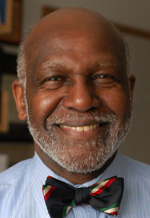 Massachusetts Institute of Technology
Massachusetts Institute of Technology
471 Memorial Drive
Suite 100
Cambridge MA 02139-4319
Phone: 617-253-0911
Email: weslhar@mit.edu
Wesley Harris currently serves as the Draper Professor of Aeronautics and Associate Provost, MIT. He has served as Head of the Department of Aeronautics and Astronautics, MIT. Served as Associate Administrator for Aeronautics, NASA; Vice President and Chief Administrative Officer, University of Tennessee Space Institute; Dean, School of Engineering, University of Connecticut. Held faculty and administrative positions at MIT, 1972-1985. Research foci: unsteady aerodynamics, aeroacoustics, rarefied gas dynamics, sustainment of capital assets, and chaos in sickle cell disease. Held distinguished, endowed professorships and lectureships. In addition, Dr. Harris served on various boards and committees of the NRC, NSF, the U.S. Army Science Board, the American Institute of Aeronautics and Astronautics, the American Helicopter Society, and the National Technical Association. Served as a member of the Board of Trustees, Princeton University. Earned BS degree in Aerospace Engineering, University of Virginia; MA and PhD in Aerospace and Mechanical Sciences, Princeton University. Fellow: AIAA, AHS, and NTA. Elected to NAE.
Evelyn L. Hu
Professor, School of Engineering and Applied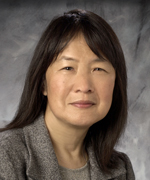 Science
Science
Harvard University
Engineering & Applied Science
Pierce Hall 113
Harvard University
29 Oxford St
Cambridge MA 02138
E-mail: ehu@seas.harvard.edu
Evelyn Hu is currently serves as the Gordon McKay Professor of Applied Physics and of Electrical Engineering at Harvard University. She received her B.A. from Barnard College in 1969 and her M.A. and Ph.D. from Columbia University in 1971 and 1975, respectively. She was employed at AT&T's Bell Laboratories from 1975 to 1984, when she joined UCSB as a full professor. She served UCSB's Department of Electrical and Computer Engineering as vice chair from 1989 to 1992 and as chair from 1992 to 1994. Hu has made major contributions to nanotechnology by designing and creating complex nanostructures. Her work has focused on nanoscale devices made from compound semiconductors and on novel devices made by integrating various materials, both organic and inorganic. She has also created nanophotonic structures that might someday facilitate quantum computing. Hu's seminal work in nanofabrication has included high-resolution patterning and high-resolution etching of circuits onto nanoscale materials. She has also developed biological approaches to nanotechnology, using biological assembly pathways to control the composition and structure of novel devices. Some of her research ideas led to her co-founding of Cambridge, Mass.-based Cambrios Technology, a start-up that is developing new, cost-effective materials of importance for electronic device applications. At UCSB, she has led the Institute for Quantum Engineering, Science and Technology, the National Science Foundation-funded Center for Quantized Electronic Structures and Center for Robotic Systems in Microelectronics, and the UCSB component of the NSF National Nanofabrication Users Network. Hu's honors include election as a fellow of the IEEE, formerly the Institute of Electrical and Electronics Engineers (1994), the American Physical Society (1995), and the American Association for the Advancement of Science (1998). She was elected to the National Academy of Engineering in 2002 and to the National Academy of Sciences in 2008.
Terry L. Hunt
Professor in the Department of Anthropology
University Of Hawaii-Manoa
Dept Of Anthropology/Saunders Hall 345
University Of Hawaii-Manoa
2424 Maile Way
Honolulu, HI 96822
Phone: 808-956-7310
E-mail: thunt@hawaii.edu
Web:http://www.anthropology.hawaii.edu/People/Faculty/Hunt/index.html/
faculty/hunt
Terry L. Hunt, is Professor in the Department of Anthropology at the University of Hawaii. He earned his Bachelor's Degree at University of Hawai`i, Hilo; his Master's Degree (First Class Honors) at University of Auckland (New Zealand); and his Ph.D. at University of Washington (1989). Dr. Hunt has taught at University of Hawai`i since 1988. His research and teaching are primarily in Pacific Island archaeology. Dr. Hunt has been conducting archaeological field research in the Pacific Islands for more than 30 years. He has done extensive work in the Hawaiian Islands, Fiji, Samoa, Papua New Guinea, and Rapa Nui (Easter Is.). Over the past several years Dr. Hunt has directed an archaeological field school on Rapa Nui (Easter Island), where he and his students continue extensive research on many aspects of the island's prehistoric past. His continuing research on the island addresses questions the trajectory of cultural and ecological changes, including the role of the colossal statues and monuments in the ancient society. Dr. Hunt has published numerous scholarly articles on Pacific archaeology, prehistory, and linguistics. His work has been published in Science, Nature, American Scientist, Proceedings of the National Academy of Science, Journal of Archaeological Science, Pacific Science, Journal of the Polynesian Society, Rapa Nui Journal, and Current Anthropology, among others. He has co-edited four books, including a collection on historical ecology and ancient landscape change. This year (2008) Dr. Hunt was awarded the prestigious University of Hawaii Board of Regents Medal for Excellence in Research in recognition of his ground-breaking work on Rapa Nui.
Marc L. Imhoff
Earth Scientist - Aerospace Technology
National Aeronautics and Space Administration
Code 614.4
NASA's Goddard Space Flight Center
Greenbelt, MD 20771 United States
Phone: 301-614-6628
E-mail: Marc.L.Imhoff@nasa.gov
Dr. Marc Imhoff works in the Earth Sciences Division at NASA's Goddard Space Flight Center as the Project Scientist for Terra - NASA's Flagship Earth Observing System Mission. As Terra Project Scientist, Dr. Imhoff coordinates an international research team using Terra and other instruments to study Earth's changing atmosphere, oceans, and land surface. He has personally conducted research on a wide range of topics including the impact of urbanization on biodiversity and food security, urban heat islands and climate, and carbon accounting using remote sensing for the Kyoto Protocol. He was a primary developer of the nighttime satellite imagery showing Earth's cities at night and pioneered the use of radar sensors for terrain and vegetation mapping. Dr. Imhoff holds a B.S. degree in Physical Geography and an M.S. Degree in Agronomy from The Pennsylvania State University and a Ph.D. in Biological Sciences from Stanford University.
Laurie E. Locascio
Chief of the Biochemical Science Division, Chemical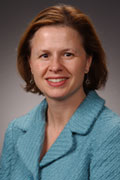 Science and Technology Laboratory, National Institute of Standards and Technology
Science and Technology Laboratory, National Institute of Standards and Technology
Analytical Chem Division
National Institute of Standards and Technology
100 Bureau Dr
Gaithersburg, MD 20899
Phone: 301-975-3130
Email: laurie.locascio@nist.gov
- Biological Applications of Microfluidics (P,G,S)
Dr. Laurie E. Locascio is a Project Leader and Biomedical Engineer in the Analytical Chemistry Division within the Chemical Science and Technology Laboraotry at NIST. She has published more than 60 papers, and has filed for 6 patents in the fields of microfluidics, biosensors and sensor/flow systems. Her current research efforts involve the design and application of microfluidic chemical systems, also known as "lab-on-a-chip" devices. This work focuses on the development of new methods for microfabrication and microsystems integration; development of fundamental methods for accurately measuring flow and temperature in microsystems; development of new methods for improved microchemical separations and detection; and the development of microscale methods to facilitate single molecule measurement and manipulation. Much of her earlier work involved the development of new methods for low-level detection of clinical and environmental analytes utilizing biological receptors for analyte recognition and employing both otpical and electrochemical elements. Some of her honors and awards include the following; US Department of Commerce Certificate of Recognition 1987, 1989, 1990; US Department of Commerce Bronze Medal Award,1991; and National Institute of Standards & Technology Applied Research Award, 1993; and National Tour Speaker for the Society of Applied Spectroscopy, 1994. Dr. Locascio is a member of the journal of Analytical Chemistry Editorial Advisory Board, the American Chemical Society, the American Association for the Advancement of Science, and Sigma Xi, and is a participant in review panels for the ATP, DAPRA, NSF and NIH. Dr. Locascio is a co-chair of the 2003 Gordon Research Conference on the Physics and Chemistry of Microfluidics.
Jessica M. Nuñez de Ybarra
Public Health Medical Officer III
California Department of Public Health
PO Box 367
Sacramento, CA 95812 United States
Phone: 916-650-6875
E-mail: jnunez2@cdph.ca.gov
Web: www.cdph.ca.gov
Dr. Núñez de Ybarra works at the State of California Department of Public Health in the Division of Communicable Disease Control in the Office of Workforce Development as a Public Health Medical Officer coordinating public health training and emergency preparedness activities and as the Division's liaison to the California Public Health Law Workgroup. She previously served as a Deputy Public Health Officer in Kern County Department of Public Health and as Director of its Office of Public Health Preparedness. She is presently a volunteer Assistant Clinical Professor at the University of California Davis (UCD) School of Medicine Department of Public Health Sciences. She has served as a lecturer in the UCD Chicano/a Studies Program. Jessica has her Medical Doctorate from the UCD and received her degree of Master in Public Health in Health Services Administration from the University of California, Los Angeles. She is Board Certified in Public Health and General Preventive Medicine. She lives in Sacramento, California with her husband Steven J. Ybarra, JD.
American Meteorological Society
Sigma Xi Lecturer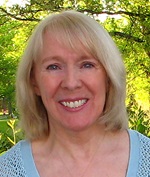
Bette L Otto-Bliesner
Senior Scientist, National Center for Atmospheric Research
Climate and Global Dynamics
National Center for Atmospheric Research
1850 Table Mesa Drive
Boulder, CO 80305
Phone: 303-497-1723
Email: ottobli@ucar.edu
Website: http://www.cgd.ucar.edu/ccr/ottobli
Bette Otto-Bliesner is a Senior Scientist at the National Center for Atmospheric Research in Boulder, Colorado. She received her B.S., M.S. and Ph.D. in Meteorology from the University of Wisconsin, Madison. Her research focuses on using computer-based models of Earth's climate to investigate past climate change and climate variability across a wide range of time scales.
Dr. Otto-Bliesner was a lead author for "Chapter 6, Paleoclimate," of the IPCC Fourth Assessment Report, which shared the Nobel Peace Prize in 2008. She serves as chair of the International Geosphere-Biosphere Programme (IGBP) Past Global Changes (PAGES). She also worked on the writing of the National Academy of Sciences report on "Surface Temperature Reconstructions for the Past 1000-2000 Years: Synthesis of Current Understanding and Challenges for the Future" and on the 2008 American Geophysical Union Position Statement on the "Human Impacts on Climate."
Gregory M. Paoli
President, Decisionalysis Risk Consultants, Inc.
Decisionalysis Risk Consultants
1831 Yale Ave
Ottawa, ON K1H 6S3
Canada
Phone: 613-260-1424
Email: gpaoli@RiskSciencesInt.com
Web: http://analyzerisk.com/bio_gpaoli.html
Greg Paoli leads a consulting firm (Decisionalysis Risk Consultants) specializing in risk assessment and risk management in the field of public health and safety. He has experience in diverse risk domains including microbiological and toxicological hazards, climate change impact assessment, air and water quality, medical and engineering devices as well as risk-based priority-setting across multiple hazards. Greg is currently serving as a Councilor of the Society for Risk Analysis. He has served as Chair of SRA's Biological Stressors Specialty Group and serves on SRA's Internationalization Task Force.
Within Canada, Greg has served on Expert Committees of the National Roundtable on the Environment and the Economy and is a member of Health Canada's Expert Advisory Committee on Antimicrobial Resistance Risk Assessment. Greg has provided guest lectures at the Queen's University's Public Sector Executive Programme and School of Public Policy, University of Calgary's Faculty of Management and the University of Ottawa's Institute of Population Health.
In the United States, Greg has served on an Institute of Medicine Committee tasked to Review the USDA E. coli 0157:H7 Farm-to-Table Process Risk Assessment. He was recently appointed to a NRC Committee entitled, Improving Risk Analysis Approaches Used by the US Environmental Protection Agency.
Greg served for several years on an Expert Panel to develop a Risk Ranking Framework for the US Food and Drug Administration and was on the Peer Review Panel for the Harvard BSE Risk Assessment. Greg has served on several international expert panels including Expert Consultations as part of the Joint Food and Agriculture Organization and World Health Organization (FAO/WHO) Activities on Microbial Risk Assessment.
He has provided training in risk assessment approaches across North America, Japan and South America. Greg also provides lectures as part of the Harvard School of Public Health continuing education course in Probabilistic Risk Assessment. Mr. Paoli earned a Master of Applied Science degree in Systems Design Engineering and a Bachelor's Degree in Electrical and Computer Engineering from the University of Waterloo.
Howard Pinderhughes
Associate Professor and Chair, University of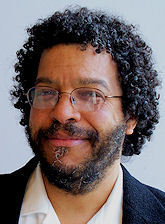 California, San Francisco
California, San Francisco
Social and Behavioral Sciences Department
3333 California Street Suite 455
University of California, San Francisco
San Francisco CA 94118
Phone: 415 502-5074
Email: howard.pinderhughes@ucsf.edu
Website: http://nurseweb.ucsf.edu/www/ffpindh.htm
Howard Pinderhughes is Associate Professor and Chair of the Department of Social and Behavioral Sciences at the University of California, San Francisco. His research examines race relations among youth, the causes and consequences of youth violence, the dynamics of adolescent relationship violence and the role of race and ethnicity in the production of health disparities. He is the author of Race in the Hood: Conflict and Violence Among Urban Youth, a study of racial attitudes among youth and racial violence in New York City. Dr. Pinderhughes is currently writing a book, Dealing With Danger: How Inner City Youth Cope with the Violence that Surrounds them that examines how urban youth think about, experience and make decisions about the use of violence. He has developed comprehensive violence prevention plans for San Francisco and Alameda Counties and is the Director of Education for the Center on Culture, Immigration and Youth Violence Prevention
William N. Ryerson
President, Population Media Center -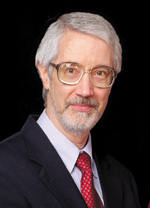 Shelburne, Vermont
Shelburne, Vermont
Population Media Center
Suite 2011, 145 Pine Haven Shores Road
P.O. Box 547
Shelburne, VT 05482
Phone: 802-985-8156
Email: ryerson@populationmedia.org
Website: www.populationmedia.org
William Ryerson is the Population Media Center's founder and President and President of The Population Institute. He has a 40-year history of working in the field of reproductive health worldwide. He is a global leader in using prime-time serialized melodramas in various developing countries to create characters who evolve into positive role models for the audience to bring about use of family planning and elevation of women's status. He received a B.A. from Amherst College and an M.Phil. from Yale University. He served as Director of the Population Institute's Youth and Student Division, Development Director of Planned Parenthood Southeastern Pennsylvania, Associate Director of Planned Parenthood of Northern New England and Executive Vice President of Population Communications International before founding Population Media Center in 1998. In 2006, he was awarded the Nafis Sadik Prize for Courage from the Rotarian Action Group on Population and Development. He became President of the Population Institute in 2008.
Francisco J. Samaniego
Professor of Statistics
University of California, Davis
Department of Statistics
One Shields Avenue
Davis, CA 95616 United States
Phone: 530-752-6490
E-mail: fjsamaniego@ucdavis.edu
Web: http://anson.ucdavis.edu/
faculty/Samaniego
Professor Samaniego received his Ph.D. in Mathematics from UCLA in 1971. After completing an NSF-sponsored postdoctoral fellowship at Florida State University, he joined the faculty at the University of California, Davis, in 1972. Dr. Samaniego's research interests include the areas of Mathematical Statistics, Engineering Reliability, Sampling Techniques and statistical applications to engineering and public health. He is an elected Fellow of the American Statistical Association, The Royal Statistical Society and The Institute of Mathematical Statistics and is an elected member of the International Statistical Institute. In 2002, Professor Samaniego was honored by the UC Davis Academic Senate with a Distinguisd Teaching Award, and in 2004, he was the seventeenth annual recipient of the UC Davis Prize for Undergraduate Teaching and Scholarly Achievement. In 2008, Dr. Samaniego received the U.S. Army Wilks' Award for pathbreaking work in the area of Reliability Theory.
National Academy of Engineering -
Sigma Xi Lecturer
Maxine L. Savitz
Vice-President, National Academy of Engineering
Los Angeles, CA 90240
Phone: 310-271-0874
Email: maxinesavitz@aol.com
Maxine Savitz is retired general manager of Technology Partnerships at Honeywell, Inc. and has more than 35 years of experience managing research, development and implementation programs for the public and private sectors, including the aerospace, transportation and industrial sectors. From 1979 to 1983 she served as Deputy Assistant Secretary for Conservation in the US Department of Energy. She was recently appointed to the President's Council of Advisors for Science and Technology. Dr. Savitz currently serves as vice-president of the National Academy of Engineering. She holds a Ph.D. in chemistry from the Massachusetts Institute of Technology and a B.A. degree in chemistry from Bryn Mawr College.
Robert Strongin
Professor of Chemistry
Portland State University
1719 SW 10 Ave, SB 2
Portland, OR 97217 United States
Phone: 503-725-9724
E-mail: robert.strongin@gmail.com
Web: http://www.pdx.edu/chem/profile/dr-robert-strongin
Dr. Robert M. Strongin is a Professor of Organic Chemistry in the Department of Chemistry at Portland State University. His expertise is in physical organic and synthetic organic chemistry. He specializes in the design and evaluation of new redox and chromophore materials which serve as selective probes and chemosensors to address challenges in materials, bioorganic and biomedical science. Dr. Strongin began his independent career at Louisiana State University where he was named Philip and Foymae Kelso West Distinguished Professor in Chemistry. He was the founding Director of the LSU Initiative for Maximizing Student Diversity Program for training underrepresented groups in biomedical research. Professor Strongin has garnered several research and teaching awards throughout his career. In addition to directing an internationally recognized, highly interdisciplinary research program, he regularly serves on federal and private foundation proposal review panels, scientific advisory and editorial boards, and as a consultant to industry.
Sheryl A. Tucker
Associate Dean of the Graduate School and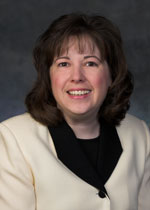 Professor of Chemistry, University of Missouri
Professor of Chemistry, University of Missouri
210 Jesse Hall
University of Missouri
Columbia, MO 65211
Phone: 573-884-1402
Email: TuckerS@missouri.edu
Website: http://sheryltucker.com
Sheryl A. Tucker is Associate Dean of the Graduate School and Professor of Chemistry at the University of Missouri (MU) in Columbia. As a higher education leader, Dr. Tucker has an outstanding record of scholarly achievement, established administrative skills and a demonstrated commitment to diversity. Prior to joining the MU faculty, she earned her Ph.D. from the University of North Texas and was a postdoc at Duke University. As a molecular spectroscopic with an interest in chemical separations, her research is a distinctive combination of both fundamental and applied studies, involving the molecular-level understanding and application dendrimers to self-assembling supramolecular nanocapsules. Dr. Tucker also founded the nationally recognized Magic of Chemistry program, designed to ignite girls' interest in science. In 2005, she received a Presidential Award for Excellence in Science, Mathematics, and Engineering Mentoring from the White House for her commitment to broadening the participation of underrepresented groups in science
Lawrence J. Wangh
Professor of Biology
Brandeis University
20 Duffield Road
Auburndale, MA 02466 United States
Phone: 781-736-3110
E-mail: wangh@brandeis.edu
Web: LATE-PCR.ORG
I received my Ph.D. from Rockefeller University in 1973 and returned to my undergraduate alma mater, Brandeis University in 1977 after four years of post-doctoral in England. For 25 years I taught and investigated aspects of the cell nucleus, developmental biology, and human reproductive. In 1997 I and my laboratory colleagues decided to enter the field of molecular diagnostics. Several serendipitous discoveries lead us to invent LATE-PCR, an advanced form of asymmetric PCR, as well as several other related chemistries. These platform technologies provide the basis for improved diagnostics in many fields because they generate more information and are quantitatively more accurate than conventional PCR. Some members of my laboratory are currently working in veterinary medicine to develop tests for Foot and Mouth Disease and Avian Influenza, while others are working in human medicine to develop sophisticated tests for hospital acquired infections (MRSA), multi-drug resistant tuberculosis (MDR-TB), and the side effects of treating HIV patients with nucleic acid analogues. Additional projects are related to stem cell research and early detection of cancer. We are now working in close collaboration with a biotechnology company with the intention of moving our science from the bench-to-the-bedside as quickly as possible. The past five year have been a thrilling global adventure comprised of discovery, invention, new learning, business, travel, and building collaborations. My major task in the next five years is to teach about our discoveries as widely as possible. I therefore look forward to sharing my experiences as a Sigma Xi Distinguished Lecturer.
Lisa H. Weasel
Associate Professor of Biology, Portland State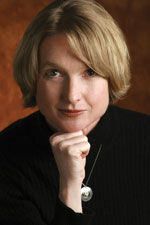 University
University
Portland State University
PO Box 751
Portland, OR 97207-0751
Phone: 503-725-3862
Email: lisaw@pdx.edu
Website: http://www.lisaweasel.com
- DNA at the Dinnertable: The Global Politics of Genetically Modified Food (P,G)
- When Ethics and Politics Intersect with Science: Lessons from the Global GMO Debates (P,G)
- Feminism in the Field(s): Gender, Globalization and the Politics of Knowledge in the GMO Debates (S)
Lisa Weasel received an A.B. magna cum laude in Biology from Harvard, and a Ph.D. in Molecular Biology from the University of Cambridge. Her postdoctoral work included training in social science research and methodologies. Her current research interests are centered on the social dimensions of science and technology, particularly ethics and equity issues relating to the life sciences. Her scholarly work encompasses a broad range of interdisciplinary topics, from feminist science studies and gender equity, to public engagement with science, to the relationship between biotechnology and sustainable agriculture and food security in the developing world. She is the recipient of numerous grants and fellowships, including a National Science Foundation CAREER Award for her interdisciplinary research investigating debates surrounding agricultural biotechnology in a global context. Her recent book, Food Fray: Inside the Controversy over Genetically Modified Food, received the 2009 Green Book Festival Prize for Best Scientific Book.
National Cancer Institute -
Sigma Xi Lecturer
Alissa Weaver
Assistant Professor
Vanderbilt University
771 Preston Research Building
Dept. of Cancer Biology
Vanderbilt University Medical Center
Nashville, TN 37232 United States
Phone: 615-936-3529
E-mail: alissa.weaver@vanderbilt.edu
Web: http://people.vanderbilt.edu/~alissa.weaver/
Dr. Alissa Weaver is an Assistant Professor of Cancer Biology at Vanderbilt University. She earned her B.S. and B.A. from Stanford University in 1991 and M.D./Ph.D. degrees from the University of Virginia in 1998. Following a postdoctoral fellowship in Cell Biology and Clinical Pathology residency at Washington University in St. Louis, she was recruited to Vanderbilt in 2003. The overall goal of her research is to understand mechanisms of tumor progression. The laboratory has a particular focus on the role of cytoskeletal rearrangements in promoting tumor invasion and metastasis. Current research projects include 1) how invadopodia, specialized subcellular structures used for cancer invasion, are formed and function in cells; 2) the role of actin assembly molecules in membrane trafficking and tumor progression; 3) integration of experimental data into mathematical models of tumor progression. You can access the Weaver Lab home page by going tohttp://people.vanderbilt.edu/~alissa.weaver/.